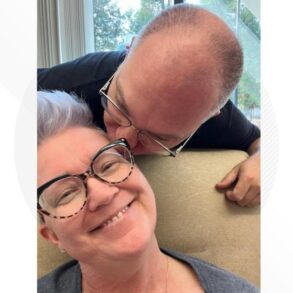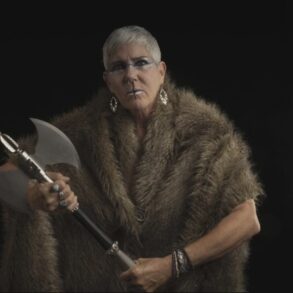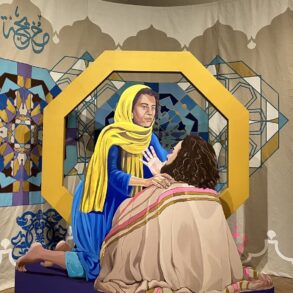On Easter Monday morning, 1964, 14-year-old Marcia Griffiths stepped onto a stage for the very first time. The occasion was an annual concert held at the Carib Theater in Kingston, Jamaica. The late Philip James of vocal duo the Blues Busters, who discovered Marcia, pleaded with the concert’s promoter Byron Lee to include her in the lineup; Lee eventually agreed to let her sing one song. She rehearsed a rendition of Carla Thomas’ raw soul ballad “I’ve Got No Time to Lose” with Lee’s band The Dragonaires; some of the musicians, however, were unhappy backing an inexperienced teenager.
Taking her place onstage, Griffiths nervously awaited the song’s jangly guitar intro. As the audience grew restless, she turned around and saw the band members laughing. “Although I was a little girl, I recognized sabotage,” Griffiths reminisces, “but it must have been the voice of God inside me that said, ‘little girl, start to sing.’ So, I did, and the musicians started following me. If you closed your eyes, you would think it was Carla Thomas. Every time I made a slur like Carla did on the original song, the place went up like the roof was going lift off; when I finished, the audience chanted, ‘bring her back, bring her back,’ but I only performed one song.”
Trending on Billboard
Fast forward 60 years to the second annual Caribbean Music Awards, held on Aug. 29 at Kings Theater, Brooklyn. Marcia Griffiths, elegantly attired in a shimmering purple dress with a gilded headwrap, strode onstage to a recording of her 1968 single “Melody Life.” Presented with a lifetime achievement award by Shaggy, who called the legendary singer “a timeless symbol of love, the very essence of reggae,” Griffiths reflected on her 1964 career-launching performance, which led to a Jamaican label bidding war and her first recording contract with Studio One, Jamaica’s Motown.
“When I walked onstage in 1964, no one could have told me that I would be standing here this evening,” said Griffiths, best known to international audiences for her 1989 single “Electric Boogie,” which spawned the Electric Slide dance, and as one of the I-Three alongside Rita Marley, Bob’s wife, and Judy Mowatt, who sang background vocals for Bob Marley. Griffiths thanked God for preserving her and concluded by reciting the refrain from her 1993 track that summarizes her ongoing commitment to her craft: “I shall sing as long as I live.”
There isn’t another Jamaican female artist who can claim the professional longevity Marcia Griffiths, 74, still enjoys. Griffiths was the headliner at the Oracabessa Festival in Queens, New York City, on Sept. 1; she then traveled to Brazil to perform two shows and in December she is one of the marquee acts performing aboard Damian Marley’s annual Welcome to Jamrock reggae cruise. Currently, the Kingston-born legend is in Jamaica preparing for her 60-year retrospective concert, Marcia Griffiths and Friends, to be held at Hope Gardens, Kingston, on Nov. 3. “I have collaborated with over 50 artists, singers and deejays (Jamaican patois rappers) so I’ll be performing with one or two of my collaborators from each decade,” Griffiths tells Billboard via Zoom. The lineup includes Shaggy, Tessanne Chin (season 5 winner of NBC’s The Voice), Tanya Stephens, deejays Busy Signal and Cutty Ranks and many surprise guest artists spanning different generations of Jamaican music. The program will include a tribute to the I-Three, with Shuga and Yashemabeth McGregor (daughter of Judy Mowatt and Freddie McGregor) singing alongside Marcia. All artists will be backed by an orchestra under the musical direction of celebrated Jamaican saxophonist Dean Fraser. “I will only see my 60th anniversary once, so I want to make the best of it,” declares Marcia.
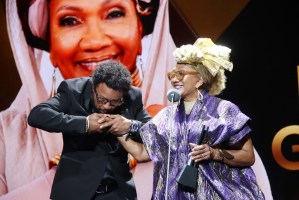
Shaggy and Marcia Griffiths onstage at the Caribbean Music Awards on Aug 29, 2024.
Steve James
The undisputed queen of reggae’s vocals sound as pristine, controlled and soulfully eloquent today as they did on her 1960s recordings for Studio One, the recording studio/record label founded by the late Seymour Clement “Sir Coxsone” Dodd. Regarded as Jamaica’s Motown because so many Jamaican luminaries recorded their initial hits there, including Burning Spear, The Heptones and The Wailers, Studio One is where Griffiths met two men who would have profound importance in her life: Bob Marley and Bob Andy (born Keith Anderson). Marcia and Bob Marley initially collaborated on the mid-60s R&B nugget “Oh My Darling.” However, it was the other Bob, not as well-known as Marley yet considered one of Jamaica’s greatest songwriters, who wrote most of Marcia’s biggest hits at Studio One, including “Truly,” “Feel Like Jumping” and “Melody Life,” all staples in her concerts to this day.
Bob Andy and Marcia’s personal relationship, as conveyed in their charming duet, “Always Together,” a gorgeous melding of Bob’s warm, expressive tone with Marcia’s exquisite timbre, shielded Marcia from lurking exploiters. “It wasn’t easy in a male dominated industry. God placed Bob Andy so that I met him at a young stage of my life, and we became intimate friends,” she explains. “Bob was at every stage show, always in the studio. He protected and advised me, saving me from many things.”
Like other hitmakers at Studio One, Bob Andy and Marcia Griffiths enjoyed their time there, despite being paid pittances, if they were paid at all. Moving over to producer Harry Johnson a.k.a. Harry J, Bob and Marcia continued recording as a duo, comparable to Motown’s Marvin Gaye and Tammi Terrell. Their reggae covers of Nina Simone’s “Young, Gifted and Black” and The Changin’ Times’ “Pied Piper,” released by Trojan Records in the U.K. (Trojan overdubbed the Jamaican recordings with strings and lush orchestral arrangements), spent 25 weeks on the British national charts between 1970 and 1971, peaking at Nos. 5 and 11, respectively, which significantly elevated reggae’s presence in the U.K. mainstream. Yet Bob and Marcia didn’t receive any financial returns. “We were signed to Trojan, but we recorded the songs for Harry J. When we asked Trojan ‘where are our royalties?’ they referred us to Harry J, and Harry J referred us back to Trojan. One day we were at Harry J’s studio, Harry had just bought a Mercedes Benz; jokingly, one of the artists asked Bob Andy, ‘brother Bob, is that your Benz?’ Bob answered, ‘well, my money buy it, but it’s not mine,’” Marcia shares with a sigh, “so we never got anything.” Bob and Marcia’s careers took separate paths as the 1970s progressed, but they reunited for performances over the ensuing years and remained close friends until Bob Andy’s death on March 27, 2020. Bob Andy will be singing alongside Griffiths, via a video appearance, at her 60th anniversary concert.
In 1973, Coxsone Dodd asked Griffiths and Rita Marley to provide harmonies alongside Judy Mowatt on a record by singer Horace Andy. Marcia had an upcoming three-night engagement in Kingston, and she invited Rita and Judy to sing backup; together they performed a few songs by The Sweet Inspirations, an American R&B vocal group. The audience’s overwhelming response to their vocal synchronizations convinced them to form a trio, which Griffiths named I-Three. “When I named the group, I said, ‘Let’s call ourselves I-Three.’ Rita said, ‘I-Three?’ And I said, ‘It’s like we three, but instead, I-Three because of the Rasta consciousness.’ A lot of people refer to us as the I-Threes, but it is really I-Three.”
Meanwhile, with the recent departure of Bunny Wailer and Peter Tosh from The Wailers, Bob Marley recruited the I-Three to provide harmonies, commencing with his Natty Dread album in 1974 and concluding with 1983’s posthumously issued Confrontation. However, it’s primarily Marcia’s supporting vocals that are heard on Marley’s Exodus (1977) and Kaya (1978), both recorded in London. In addition to their soaring, gospel-tinged voices, the I-Three’s regal attire and graceful choreography added a stunning visual element to Marley’s concerts. The trio toured the world with Marley until his final performance in Pittsburgh, Penn., on Sept. 23, 1980, just eight months before his passing on May 11, 1981.
Griffiths expresses profound gratitude for the life-changing insights she gained working with Marley, which impacted her approach to music making and, ultimately, her understanding of the music business. “Bob Marley was truly sent by the Almighty God. He was on a mission to get his messages out to the world. That’s when I realized your utterances in songs take on an energy that manifests,” Griffiths proclaims. “When I saw how seriously Bob took his music, I started to look deeply at the business part of the industry, which I had ignored. I realized the publishing for the biggest song I wrote, ‘Steppin’ Out of Babylon’ [from her acclaimed 1979 album Steppin’] was registered to someone else.” For many years Griffiths didn’t receive any royalties for “Electric Boogie,” which reached No. 51 on the Hot 100 and remains the best-selling single by a Jamaican female reggae artist. Bunny Wailer wrote the song, but the beat was created on a rhythm box Marcia purchased in Canada. “Bunny said he told the record company to give me 50% of the publishing because the music is mine, but he claimed 100%,” Griffiths says. “I have since reclaimed these songs, but I should have been capitalizing on them when they were really selling.”
Griffiths enjoyed the recent biopic Bob Marley: One Love, which spans the Dec. 3, 1976, assassination attempt on Marley’s life, his subsequent 14-month self-imposed exile period in England and his triumphant return to Jamaica, headlining the One Love Peace Concert on April 22, 1978. However, she had hoped to see a greater representation of “things that Bob did to teach, educate and unite us all, there were many other things that could have been shown.”
Griffiths was pleased with Jamaican vocalist Naomi Cowan’s portrayal of her in the film. Naomi says Jamaica’s long-reigning first lady of song continues to inspire the island’s young female vocalists. “When I started my reggae career, I pulled inspiration from Marcia, and covered her songs in my set,” Cowan explained. “Marcia has transitioned through many time periods and she’s still working. I can’t think of one female singer in our space who doesn’t see her as the prototype; she has cemented herself as a living legend.”
Griffiths’ storied association with Bob Marley has somewhat overshadowed her exceptional solo work throughout the 1970s. Her 1978 album Naturally is widely considered a masterpiece of Jamaica’s roots reggae golden era, with her flawlessly executed, poignant vocals supported by The Revolutionaries’ indelible reggae grooves and Sonia Pottinger’s sparkling production. Standout tracks include “Dreamland,” an idyllic interpretation of American group the El Tempos’ 1963 original “My Dream Island”; an R&B-tinged remake of Bob Andy’s rocksteady repatriation anthem “I’ve Got to Go Back Home”; and the album’s most striking cut, “Survival (Is the Game),” on which Griffiths compassionately imparts words of solace to women in abusive relationships. “The song’s lyrics [written by Brent Dowe of the Jamaican rocksteady trio The Melodians] say, ‘You push me ’round like I’m just a clown/you wanna see me suffer…but I’ll get on my feet again.’ I was really going through some changes and many sisters went through the same thing. I’ve seen men abuse women, whether verbal or physical, so that song is a tribute to my sisters, and they love it so much,” she shares.
Griffiths is one of the few artists of the pioneering reggae generation who made a successful transition into the computerized dancehall era. With the burgeoning digital technology of the 1990s, Penthouse Records owner/producer Donovan Germain reworked classic reggae riddims and paired her silky vocals with the period’s most popular deejays, including Tony Rebel (“Ready to Go”), Cutty Ranks (“Half Idiot”), Buju Banton (“Closer”) and singer Beres Hammond (“Live On”), in addition to Marcia’s solo recordings, such as the enchanting “Land of Love.”
Griffiths has also recorded with numerous Jamaican artists who’ve made their mark in the 21st century including singer Da’Ville (“All My Life”), Busy Signal (“Automatic (Keeping It Real)”) and sing-jay Queen Ifrica (“Round and Round”). Plus, Chronixx wrote Marcia’s 2018 single, “Queen of Paradise,” produced by Sly & Robbie. Griffiths’ multigenerational appeal is one of the most treasured aspects of her illustrious career — or as she calls it, her divine journey. “God has blessed me because since I started, there isn’t a year that I’m not busy traveling, performing and releasing songs,” says Griffiths, who is currently working on two albums. “I may not have gotten my financial rewards but to cut across age barriers and inspire 90% of the women in the business today brings a spiritual satisfaction that is priceless.”
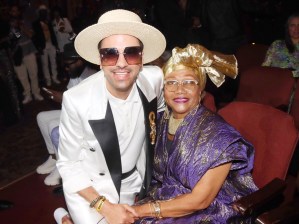
DJ Cassidy and Marcia Griffiths at the Caribbean Music Awards on Aug 29, 2024.
Steve James




